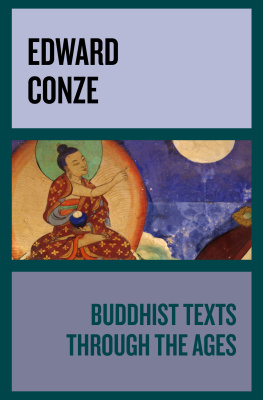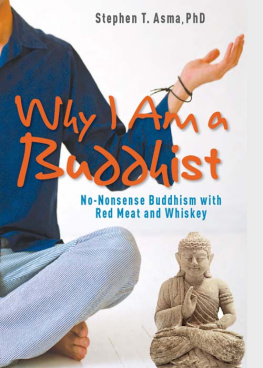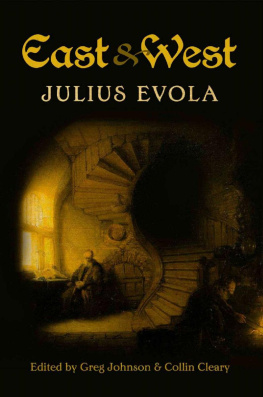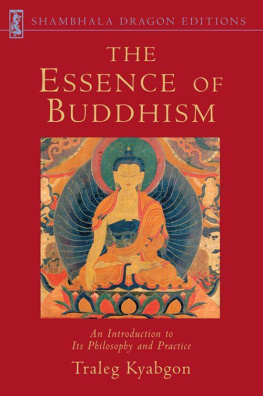THE ESSENCE OF BUDDHISM
* * *
Edited by
E. HALDEMAN-JULIUS
*
The Essence of Buddhism
From a 1922 edition
ISBN 978-1-62011-514-5
Duke Classics
2012 Duke Classics and its licensors. All rights reserved.
While every effort has been used to ensure the accuracy and reliability of the information contained in this edition, Duke Classics does not assume liability or responsibility for any errors or omissions in this book. Duke Classics does not accept responsibility for loss suffered as a result of reliance upon the accuracy or currency of information contained in this book.
Contents
*
Preface
*
I am glad to be permitted thus to say, in a few words of introductionto this well-meditated little volume, how pleasant and how profitablean idea it must be considered to have designed and compiled a Buddhistanthology. Selecting his cut and uncut jewels from very variousBuddhistic sources, Mr. Bowden has here supplied those who buy and usethe book with rubies and sapphires and emeralds of wisdom, compassion,and human brotherhood, any one of which, worn on the heart, would besufficient to make the wearer rich beyond estimation for a day. Theauthor disclaims any attempt to set forth a corpus of Buddhisticmorality and doctrine, nor, indeed, would anything of the kind bepossible within such narrow limits; but I rejoice to observe how welland faithfully his manifold extracts from the Sacred Books of Indiaand the East exhibit that ever-pervading tenderness of the greatAsiatic Teacher, which extended itself to all alike that live. Thiscompassionateness of Gautama, if nothing else had been illustrated bythe collection, would render it precious to possess and fruitful toemploy; but many another lofty tenet of the "Light" of Asia findsillumination in some brief verse or maxim as day after day glides by;and he who should mark the passage of the months with these simplepages must become, I think, a better man at the year's end than atits beginning. I recommend this compilation without hesitation orreserve.
EDWIN ARNOLD.
Compiler's Proem
*
E. M. BOWDEN.
In this compilation no attempt has been made to present a general viewof Buddhism as a religious or philosophical system. The aim has ratherbeen to turn Buddhism to account as a moral force by bringing togethera selection of its beautiful sentiments, and lofty maxims, andparticularly including some of those which inculcate mercy to thelower animals.
On this point a far higher stand is taken by Buddhism than byChristianityor at any rate than by Christianity as understood andinterpreted by those who ought to know. Not only is the whole questionof our duties to the lower animals commonly ignored in Christian worksas, for instance, in the famous Imitation of Christ, and scores ofothers; but, as if this were not enough, a reasoned attempt hasactually been made, on the strength of Christian teaching, to explodethe notion that animals have any right (e.g., in Moral Philosophy, byFather Joseph Rickaby). Very different in this respect is the tone ofthe average Buddhist treatise, with its earnest exhortations,recurring as a matter of course, to show mercy on every living thing;and this difference alone is an adequate reason for compiling aBuddhist anthology.
In regard to the sources quoted from, considerable latitude seemedallowable. They do not all, by any means, possess canonical authority.But they are all distinctly Buddhist in character. The supposed datesof the originals range from at least the third century B. C. tomedieval and later times.
Hence, it is clear that, should any one think to make use ofquotations from this work for controversial purposes, a certain degreeof caution will be necessary. The context of the passage, and the dateand the authorship of the original work, may all need to be taken intoaccount; while it must also be borne in mind that the religious terms,such as "heaven" and "sin," which have to be employed in English, donot always correspond exactly to the Buddhist conception.
Of the numerous Buddhist works which have now been translated fromsome eight or ten eastern languages, the greater number, when regardedpurely as literature, occupy a very low level. At times they are soremarkably dull and silly that the reader is inclined to ask why theywere ever translated. But the one redeeming feature in the voluminouscompositions of Buddhist writers is the boundless compassion whichthey consistently inculcate.
The insertion of a passage in these pages does not necessarily implythat the compiler accepts in its entirety the teaching it conveys.Concerning that oft-repeated injunction, not to kill any livingcreature whatsoever, we can hardly doubt that there are many cases inwhich to take life, provided it is taken painlessly, not only is noton the whole an unkindness, but is an act of beneficence. If wesometimes give to this injunction the sense of extending our sympathyto the lowest sentient being, and not causing pain to living creatureswhile they live, we shall perhaps not be doing violence to the spiritof mercy by which it was prompted. There are many passages in Buddhistworks which advocate preference for the spirit over the letter, or theexercise of judgment in accepting what we are taught.
A few passages, though not many, have been included more because theyare striking or poetical than for the sake of their moral teaching.
As the references given are mostly to the Oriental origins, it is onlyfair to insert here a list of the English and French translationswhich have been principally used in compiling this book. The followingworks comprise most of those which have proved directly of service forthe purpose"Sacred Books of the East," namely:
Vol. 10. Dhammapada, by F. Max Muller; and Sutta-Nipata, by V. Fausboll.
Vol. 11. Buddhist Suttas, by T. W. Rhys Davids.
Vol. 13. Vinaya Texts, part 1, by T. W. Rhys Davids and H. Oldenberg.
Vol. 17. Vinaya Texts, part 2, by T. W. Rhys Davids and H. Oldenberg.
Vol. 19. Fo-sho-hing-tsan-king, by Rev. S. Beal.
Vol. 20. Vinaya Texts, part 3, by T. W. Rhys Davids and H. Oldenberg.
Vol. 21. Saddharma-pundarika, by H. Kern.
Vol. 35. Questions of King Milinda, part 1, by T. W. Rhys Davids.
Vol. 36. Questions of King Milinda, part 2, by T. W. Rhys Davids.
Vol. 49. Buddhist Mahayana Texts, by E. B. Cowell, F. Max Muller, and J. Takakusu.
"Sacred Books of the Buddhists," namely: Vol. 1. Jatakamala, by J. S. Speyer. Vol. 2. Dialogues of the Buddha, by T. W. Rhys Davids.
The Jataka, or Stories of the Buddha's Former Births, translated under the editorship of Professor E. B. Cowell.
Buddhism of Tibet, by L. A. Waddell.
Buddhism in Translations, by H. C. Warren.
Travels of Fa-hien, by James Legge.
Selected Essays, by F. Max Muller.
Buddhist Birth Stories, or Jataka Tales, by T. W. Rhys Davids.
Hibbert Lectures for 1881, by T. W. Rhys Davids.
Buddhism, by T. W. Rhys Davids.
Catena of Buddhist Scriptures from the Chinese, by Rev. S. Beal.
Abstract of Four Lectures on Buddhist Literature in China, by Rev. S. Beal.
Romantic Legend of Sakya Buddha, by Rev. S. Beal.
Texts from the Buddhist Canon known as Dhammapada, by Rev. S. Beal.
Udanavarga, by W. W. Rockhill.
Lalita Vistara, by Rajendralala Mitra.
Sanskrit Buddhist Literature of Nepal, by Rajendralala Mitra.
Mahavamsa, by L. C. Wijesinha.
Attanagalu-vansa, by James D'Alwis.
Archaeological Survey of Southern India (new series of reports), vol. 1, by James Burgess, with translations by Georg Buhler.





![Watts - The way of Zen = [Zendō]](/uploads/posts/book/242017/thumbs/watts-the-way-of-zen-zend.jpg)



